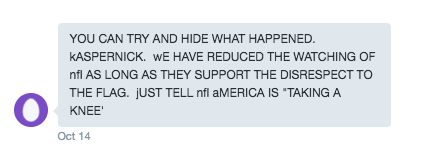Even the NFL doesn't know why NFL ratings are tanking
By now you’ve surely heard that the National Football League’s television ratings are down this season by double digits compared to last year. Ratings are down more than 10% on average through Week 7 of the season, and some nights have been down by more than 20%.
What’s causing the slide? It isn’t one single factor, but many. And no one knows for sure which single factor is having the biggest effect—including the NFL.
“We really don’t know,” says a source who works at the league and commented on condition of anonymity.
Roger Goodell, the league’s commissioner, said this month at the NFL owners’ meeting, “I don’t think there is a single reason for it,” but then appeared to point primarily to the election cycle, adding, “the two primetime games that saw our most dramatic decrease went straight up against two very significant debates.”
Blaming the election is the official stance the league has taken, saying in a statement this month that the dip, “is likely due to a confluence of factors headlined by the attention around our presidential election, which is unprecedented.”
The league doubled down on this in a memo sent to its media committee, writing, “There is no question that unprecedented interest in the Presidential election is impacting primetime ratings” and even pointing to history to emphasize the point: “The effect of the Presidential election on NFL ratings has been seen before: in 2000, during the campaign between George W. Bush and Al Gore, all four NFL broadcast partners suffered year over year declines.”
Behind closed doors, at the league’s offices, it’s a different story: no one is certain that the election is to blame; no one is certain of anything. “We all talk about it and we just don’t know,” says the same league source. “But once the election is over, then we’ll really see.”
Indeed, while the Trump-Clinton debates indisputably sapped NFL ratings on those two nights, the debates are over and ratings are still down, so it can’t only be the election. And it’s a stretch to suggest that on football nights, football fans are turning to CNN for election coverage instead of watching football.
At the moment, there’s also the World Series to contend with, and Game 5 of the Chicago Cubs vs Cleveland Indians bested Sunday Night Football.
In a story earlier this month, we pointed to the rise of cord-cutting (an issue particularly hounding ESPN), and the availability of more quickly-digestible clips of games than ever before on social media, as two additional causes of the ratings decline.
But every fan has their own answer. Many critics on Twitter insist that they are outraged over the player protests led by Colin Kaepernick (kneeling during the national anthem), but no good evidence exists to suggest that any significant number of viewers is boycotting the league over this. And in the league’s memo to its media committee, it wrote, “We see no evidence that concern over player protests during the National Anthem is having any material impact on our ratings.”

Similarly, some pundits point to impossible-to-quantify factors like the league’s poor recent history of handling domestic violence issues, or the circus-like “Deflategate” scandal of last season. But there’s no way to prove that these have led fans to flee.
A better theory: NFL ratings could not rise forever. There was a ceiling on the popularity of the NFL, and it has reached that ceiling.
That encompasses more micro explanations like the poor quality of many games this season (average Monday Night margin of victory is nearly double what it was last year), over-saturation of games in general, poor officiating and a rise in penalties, and the league’s crackdown on touchdown celebrations.
@readDanwrite @JamieOGrady @ConnorFinnegan what about really bad football? The games have been unwatchable.
— Tim Hodge (@TimMavTv) October 18, 2016
Perhaps the most useful perspective on the ratings crisis came from Mike Mulvihill, senior vice president for programming at Fox Sports, who has said that fans are watching less of the games that they do tune in to. That is: football fans may not be skipping games entirely, but are not compelled to stick with a game until the end.
That fact bolsters many of the other popular responses: that the game play quality has declined; that fans can catch the highlights in a video on social media later; that fans are more interested in consuming some other content (Netflix, perhaps?) than a full NFL game.
“We don’t make excuses,” Goodell said at the NFL owners’ meeting. But the league does normally have a public-facing explanation (even if the public doesn’t like the explanation) for most issues, scandals, or news events about pro football.
What has happened over the first eight weeks of this year’s NFL season has left the league publicly scratching its head—a rarity.
—
Daniel Roberts is a writer at Yahoo Finance, covering sports business and technology. Follow him on Twitter at @readDanwrite.
Read more:
The 3 biggest reasons NFL ratings are down
NFL social media chief explains NFL’s controversial new social media policy
